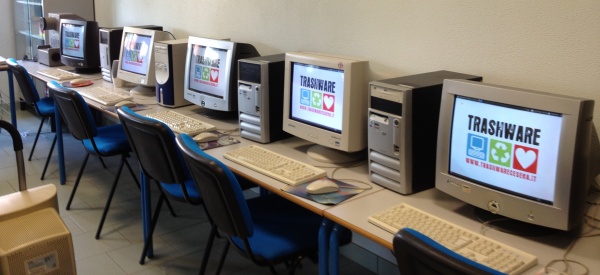Trashware, a practice whose time has passed?
“Nobody wants computers anymore”.

Back in 2010, I explained that “trashware” is the practice of saving “old” computers from the trash bin, and successfully reusing them, thanks to Free Software like Linux. Today, I share, with permission from the author, a reformatted translation of this email about the serious limits and hurdles of doing trashware today.
Trashware “out of necessity” is pretty much over
Giomba’s personal personal opinion is that Trashware “out of necessity” is an activity whose time has passed. These days, he points out, you may solve or avoid all the problems around trashware by buying a new tablet with just 50 Euros. Regardless of prices (because trashware is often donated), today there is a huge mismatch between demand and what is actually possible to offer. In a nutshell, this happens because:
- trashware is made (and doable) with desktop computers
- nobody wants a desktop computer anymore
This situation became much more common during the COVID lockdown. Many families, especially poor families, did suddenly ask for many more donated or very cheap “computers”, to allow their children to follow school lessons from home. But in practice, what they meant and would accept as “computers” was only laptops, if not tablets.
Can you blame them? Besides putting bread on the table, a family with 2, 3 or more children in school may simply have no concrete ways to procure enough desks for desktop computers out of the blue (assuming they do have enough space for those desks to begin with…).
Problem is, laptops and tablets are hard to recover because usually you can’t replace broken parts unless you happen to have another identical device, which is very seldom the case for any small trashware group. Tablets are bad even from the software side, each one is its own case, and even merely reformatting them takes a huge amount of time.
A concrete example: the “Civic Digital” trashware effort in Empoli
During the worst moments of the COVID pandemic, in March 2020 and 2021, the administration of the tuscan city of Empoli and Giomba’s trashware group worked together to bring donated computers to students and families who could not afford to buy them new:

That initiative did get good exposure from local media and institutions. However, only 42% of the computers they accepted could be actually fixed and donated, and that’s only because they repeatedly turned down all sorts of surely unusable hardware, from CRT monitors, dot printers or even… Commodore 64s. Eventually, they could deliver only about 40 computers (in a town of almost 50K residents), and without really satisfying many of the recipients, for the reasons above.
Be that as it may…
Giomba’s own, final observations were that, when compared with the huge effort madem, 40 computers are a really small number, that make it hard to expect that trashware may be regularly practiced. But if asked again to do it, they will certainly accept, as knowing they can help someone is always a great reward!
Who writes this, why, and how to help
I am Marco Fioretti, tech writer and aspiring polymath doing human-digital research and popularization.
I do it because YOUR civil rights and the quality of YOUR life depend every year more on how software is used AROUND you.
To this end, I have already shared more than a million words on this blog, without any paywall or user tracking, and am sharing the next million through a newsletter, also without any paywall.
The more direct support I get, the more I can continue to inform for free parents, teachers, decision makers, and everybody else who should know more stuff like this. You can support me with paid subscriptions to my newsletter, donations via PayPal (mfioretti@nexaima.net) or LiberaPay, or in any of the other ways listed here.THANKS for your support!